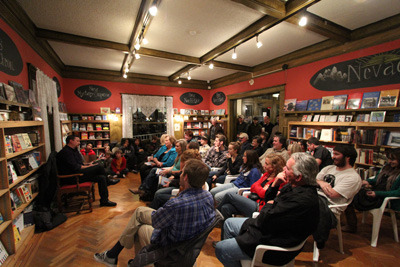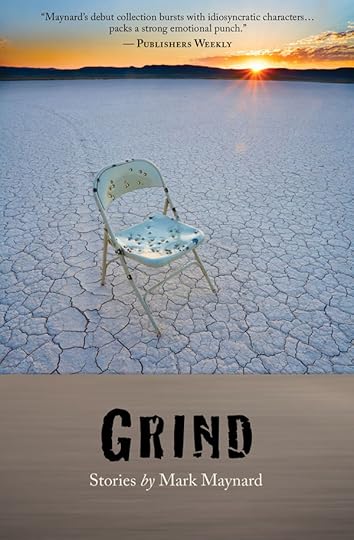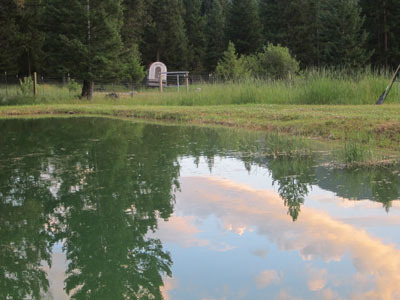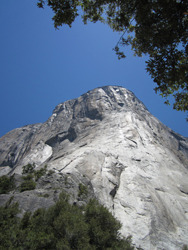Mark Maynard's Blog
February 2, 2013
Begin at the Beginning: On Starting to Write a Novel
 I’m teaching a novel-writing class to my community college students this semester. As we gathered together in the classroom this week, I gave them their first assignment: Start Your Novel.
I’m teaching a novel-writing class to my community college students this semester. As we gathered together in the classroom this week, I gave them their first assignment: Start Your Novel.
Clearly, this is easier said than done. As I looked into the faces of my students, I knew that they needed more direction.
“Begin at the beginning,” I said. “It’s easy.”
We were all readers before we were writers, and as such, our ideas of beginnings have been forever skewed. We tend to confuse the experience of the reader with the work of the writer.
My students are smart, and many of them have already written some very good short stories in a previous class, and have read and analyzed the craft of a great deal more. They have good instincts and inclinations.
“It needs to have a good hook,” one of them said. And she was right. But I explained that sitting around all day trying to come up with that hook was not going to do anyone any good.
To illustrate my point, I pulled up a website that had gathered its list of the 100 best opening lines in literature. Many of the expected novel openings were there – Ishmael casually greeting the reader, Dickens’ paradox of two cities, and Hemingway’s introduction of his aging Cuban fisherman Santiago.
Were these the first lines each of these writers composed? Did Melville sit down one day and write “Call me Ishmael”?
Every book has two beginnings. But the reader is only privy to one. And the author must begin in a much different place. Before the story can start, the process must be put into motion. These distinct beginnings are a matter of point of view (that of the writer, and of the reader) and are often separated by years, sometimes by centuries.
Think of the opening of any novel as the beginning of a stage play. The house lights come down, the actors take their places and the curtain parts as the stage lights come up. The play begins – for the audience.
But the writer begins a story much earlier. Someone had to make careful decisions at every step along the way. Actors had to be cast in the proper roles. The interpretations of lines and movements had to be discussed, reworked, blocked and refined by actor and director in collaboration. There were sets to design, build and paint. The sound, lighting and costuming had to be planned and executed in detail. In fiction, all of this must be undertaken by the author before the expectant moment of “beginning” occurs for the reader on page one. It’s messy, tedious, and necessary.
So where does a book begin for an author? In setting the stage. A writer must build an inventory of potential, both good and bad, for a protagonist. He or she must create the chance for conflict to challenge and define characters. The one thing a book needs more than anything in its infancy is momentum.
In order to sustain this momentum, and build the potential energy that will be changed into kinetic energy through the narrative, an author must be okay with rough, unproven, inelegant prose, awkward characters, and under-developed plots. One must simply keep going, push through the doubt, and work every day to close the gap between the beginning of novel writing (and its inherent sawdust, discarded scraps and bloodied knuckles), and the beginning of the novel.
On the Kindness of Writers (and the Generosity of Readers)
 My debut collection of short stories has been out now for
My debut collection of short stories has been out now for
just over a month. The process of writing – a solitary, and sometimes torturous
pursuit, is instantly replaced by bringing the work to people by any means
possible. This means an author must now engage in the delicate art of
self-promotion. Part salesman, part performer, part teacher – I reach out to
reporters and booksellers, bloggers and avid readers, and try to interest them
in my stories
One aspect of this process is the fine art of “blurbing.” An
author must reach out to other writers, sending out galleys and advanced reader
copies, hoping that those who’ve already had a book published will see
something in your writing that they like, and will write two, three, maybe even
four lines about it to put on the back cover of your book.
It was during this process that I was once again struck by
the kindness of writers. While not everyone that I reached out to could, or was
willing to give me a blurb for my book, each and every last one of them not
only wished me well – they personally took an interest in me and my work. They
asked for advance copies of the book when it came out. When I sent them along,
I received personal emails, notes of congratulations, even a funky handwritten
postcard with a vintage picture of a cowboy astride a gigantic jackrabbit from
an author I’ve never personally met.
In the increasingly competitive world of publishing, one
might expect that writers could be a cutthroat breed, willing to engage in a
vindictive blood sport for the shrinking pool of royalties from an industry we
are constantly told is dying, forever transformed by e-readers, the internet,
and the supposedly impending loss of the brick and mortar bookstore. Yet most
authors that I’ve met treat every publication of every story as a win for the
craft of writing itself.
I’ve seen successful writers and colleagues devoting a great
deal of time consulting, inspiring and promoting younger authors in workshops,
undergraduate classes and graduate MFA programs and through literary journals.
Rather than keeping their methods and experiences closely guarded secrets, they
openly share them, encouraging others to follow their successes, and learn from
their failings.
And it’s not just writers who selflessly put literature
ahead of individual glory. The owners and buyers and employees of independent
bookstores like Reno’s Sundance and the Bay Area’s Book Passage work to put as
many authors and books in front of readers as is humanly possible.
Those readers are what keep the whole thing going. The
reason why my publisher decided to get into a business that runs on the
tightest of margins. The people who come out to readings and ask incredible
questions about the genesis of a story, the method that led to its creation and
the hopes they have for its characters.
I am grateful to all of these lovers of the written word.
Writers, and especially readers, allow one to forget about the lonely aspects
of his or her profession and to instead become part of a community that cares
about craft, creative expression, and the constant exploration of the human
condition.
January 21, 2013
On the Kindness of Writers (and the Generosity of Readers)
 My debut collection of short stories has been out now for
My debut collection of short stories has been out now for
just over a month. The process of writing – a solitary, and sometimes torturous
pursuit, is instantly replaced by bringing the work to people by any means
possible. This means an author must now engage in the delicate art of
self-promotion. Part salesman, part performer, part teacher – I reach out to
reporters and booksellers, bloggers and avid readers, and try to interest them
in my stories
One aspect of this process is the fine art of “blurbing.” An
author must reach out to other writers, sending out galleys and advanced reader
copies, hoping that those who’ve already had a book published will see
something in your writing that they like, and will write two, three, maybe even
four lines about it to put on the back cover of your book.
It was during this process that I was once again struck by
the kindness of writers. While not everyone that I reached out to could, or was
willing to give me a blurb for my book, each and every last one of them not
only wished me well – they personally took an interest in me and my work. They
asked for advance copies of the book when it came out. When I sent them along,
I received personal emails, notes of congratulations, even a funky handwritten
postcard with a vintage picture of a cowboy astride a gigantic jackrabbit from
an author I’ve never personally met.
In the increasingly competitive world of publishing, one
might expect that writers could be a cutthroat breed, willing to engage in a
vindictive blood sport for the shrinking pool of royalties from an industry we
are constantly told is dying, forever transformed by e-readers, the internet,
and the supposedly impending loss of the brick and mortar bookstore. Yet most
authors that I’ve met treat every publication of every story as a win for the
craft of writing itself.
I’ve seen successful writers and colleagues devoting a great
deal of time consulting, inspiring and promoting younger authors in workshops,
undergraduate classes and graduate MFA programs and through literary journals.
Rather than keeping their methods and experiences closely guarded secrets, they
openly share them, encouraging others to follow their successes, and learn from
their failings.
And it’s not just writers who selflessly put literature
ahead of individual glory. The owners and buyers and employees of independent
bookstores like Reno’s Sundance and the Bay Area’s Book Passage work to put as
many authors and books in front of readers as is humanly possible.
Those readers are what keep the whole thing going. The
reason why my publisher decided to get into a business that runs on the
tightest of margins. The people who come out to readings and ask incredible
questions about the genesis of a story, the method that led to its creation and
the hopes they have for its characters.
I am grateful to all of these lovers of the written word.
Writers, and especially readers, allow one to forget about the lonely aspects
of his or her profession and to instead become part of a community that cares
about craft, creative expression, and the constant exploration of the human
condition.
December 2, 2012
On Launches, Milestones, and Stories Yet to be Written

My first book will be launched this week at my local independent bookstore. Fliers have been printed and posted, and friends and
family have been invited. It is an exciting thing to contemplate, and one that
comes with a good deal of anxiety as well. This week I have been digging
through the book, looking for passages to read from, and already hearing my
words in new and different ways.
When I began the first stories in the book several years
ago, I had a much different perspective of what launching a book would be like.
At the time, I looked at the publication of a book as the culmination of
something – a finish line of sorts. Now, I realize that the release of this
work is not the end, but simply another milestone along the way.
The book will not “exist” until some one picks it up and
begins to read it. This process, the “second act” of creation, will result in
wildly different personal interpretations, evaluations and imaginings of the
words set on the page. It is now out of my hands. I have done my half of the
work, and now the readers (and I hope they are many) complete the process.
Writing is a very solitary profession. I have participated
in countless workshops, conferences, classes, and writing groups over the years
– and these have been helpful to my craft, as well as to my development as a
writer. But in the end, it is work done alone, and asks of a writer a great
deal of risk and responsibility. In the end, we must own what we write.
It is not the work of a single person however. On every page,
there is tangible evidence of others. This begins with people I’ve known (and
many I have not) and the stories of their lives, from which I’ve borrowed
heavily. Some may recognize a glimpse of themselves on the page. Several did
not live long enough to see their stories in print. There are others as well: colleagues,
mentors, workshop mates, creative writing students, published and unpublished
authors, friends, family members, publishers, and editors, those who rejected
my work and those who encouraged it, all who have knowingly or unwittingly
affected my writing.
Then there are the people I have met along the way (and
those I’ve not yet encountered) that are already helping me write the next
stories. And of course, the readers, who will write and re-write the stories of
my book in a way that suits them.
And so, into the world go my stories, and with them all of
those who shaped, informed and inspired them.
To all of them, I am grateful.
November 16, 2012
Some Where: Considering "Literature of Place"

In our increasingly homogenized America, a land of freeways, strip malls full of familiar franchises, grocery chains and big box superstores, there is a strong urge to connect once again to everything local.
This is exemplified by a booming “locovore” movement, for which many are willing to pay a premium. This food is fragile. To be eaten fresh, it must be from nearby, and can’t possibly survive a long journey by truck, rail or even plane. We seek the tangible effect of “grown here, grown today” food.
Literature can have that effect too. And even better, a good book is non-perishable.
Writer Barry Lopez says of “Literature of Place,” that it is characterized by “geography as a shaping force, not a subject.”
Place is not just a point on a map. Cormac McCarthy’s vivid southern borderlands and Raymond Carver’s rain and alcohol-soaked Northwest are less about landscape and geography than they are about characters for whom that place is their only reality – they exist in, make use of, and are shaped by their environs.
Nature writing has been an integral part of American literature since its inception. As the relationship between humans and the land has grown more tenuous and distanced, the focus has evolved from a wilderness of mystery and transcendental potential to recognition of the environment’s fragile existence and its key to our own practical and spiritual sustenance.
Writing about place works to give readers a benchmark. A good story is a brass plaque embedded in the asphalt of a city street, or the granite of a Sierra peak. We respond to markers, from which we can set out in any direction and mark our journey. “Place” is not simply a sense of geography. It helps us to mark time, our location in culture and society, and our own sense of personal and collective existence. Literature of Place then, is a microcosm of one of the key purposes of literature itself. It is a way through which we can comprehend a sense of otherness, not only for its empathetic effect, but also as a means through which we can better understand ourselves.
We like to be some where.
Come discuss Literature of Place tonight (11/16/12) at Sundance Bookstore as part of the Nevada Humanities Salon series with Mark Maynard, Dr. Alicia Barber and moderator Karen Wikander.
November 2, 2012
What I Learned About Craft from Yosemite's Big Wall Climbing Legends
 I’ve had the great fortune to be invited along on a new creative project that is full of true and figurative adventure. I’m part of a small team working on a documentary film of legendary climbing gear designer, photographer, inventor and iconic Yosemite climber Tom Frost. Recently, our three-man film crew had the opportunity to attend the first annual Oakdale Climbers Festival. Here, we interviewed an incredible number of influential climbers from the last 50 years of Yosemite’s storied climbing legacy (including Doug Robinson, Glen Denny, Paul Piana, Steve Grossman, Peter Haan, Ken Yager and Hans Florine) and heard the stories of living legends (including Al Steck, Jerry Gallwas and the team of Tom Frost and Royal Robbins).
I’ve had the great fortune to be invited along on a new creative project that is full of true and figurative adventure. I’m part of a small team working on a documentary film of legendary climbing gear designer, photographer, inventor and iconic Yosemite climber Tom Frost. Recently, our three-man film crew had the opportunity to attend the first annual Oakdale Climbers Festival. Here, we interviewed an incredible number of influential climbers from the last 50 years of Yosemite’s storied climbing legacy (including Doug Robinson, Glen Denny, Paul Piana, Steve Grossman, Peter Haan, Ken Yager and Hans Florine) and heard the stories of living legends (including Al Steck, Jerry Gallwas and the team of Tom Frost and Royal Robbins).
As a writer, I’ve often turned to, read about and taught the words of other authors as they’ve related their ideas and experiences of writing as a craft, rather than as a deeply-ingrained talent that some elite few were somehow born with. After spending a long weekend with a group of eclectic, bearded souls with calloused hands and sinewy forearms, I realized that writers can learn a lot from those that have dedicated their lives to the craft of climbing.
Climbers see the ascents of sheer granite faces as problems to be solved, games to be played and emblems of a life to be lived in harmony with nature. Perseverance, and the ability to put aside fear and self-doubt are far more important than raw talent. Collectively and individually, they are the most self-sufficient, ascetic artists I’ve met. The Golden Age of Yosemite Climbers strove to adhere to the ideals of their mentor and inspiration, John Salathé, bringing a quart of water per man, per day, while vertically moving, inch-by-inch, on week-long climbs of grueling physical activity against sweltering granite cliffs. They were doing this using homemade equipment – thin metal wedges that had been hand-hammered and shaped on anvils in backyard forges – not only to ascend, but also for their own tenuous protection from fatal falls. It’s the writer’s equivalent of creating a novel on a hand-built typewriter that the self-same author had somehow kluged together from pen springs, hacksaw blades and handmade ink. Imagine using a font that had been manually shaped and pressed on small bits of scrap metal to the tip of each typewriter key, simultaneously crafting the work of art and the tools used to create it.
More on the documentary, and the birth of Flatlander Films soon.
August 21, 2012
Review of Peter Heller's "The Dog Stars"
 The Dog Stars by Peter Heller
The Dog Stars by Peter HellerMy rating: 5 of 5 stars
While this book merits the numerous comparisons with Cormac McCarthy's "The Road," Heller's post-apocalyptic near future is even more plausible (at least for someone living in the West) with its beetle-distressed trees, seemingly endless drought and constant wildfire smoke hovering on the summer horizon. While the plot focuses on a post-pandemic flu way of life, it is the characters, expertly rendered and well-rounded, that drive the novel forward, especially the yin and yang of Hig and Bangley, an odd couple that has set up a home of sorts at an abandoned airport. Heller's sparse, fluid prose is channeled through the quirky voice of narrator Hig, and the story is his emotional and physical journey through the altered landscapes of both his dream world and the new reality of a sparsely populated, always dangerous West.
View all my reviews
April 23, 2012
The Things I Carried: Sharing the Gift of Reading with World Book Night 2012
[image error] Tonight is World Book Night,
and I was honored to be one of the "givers" in the inaugural U.S.
event. I had requested (and received) 20 copies of Tim O'Brien's
Vietnam-set short story collection "The Things They Carried." Late last week, I called the Veteran's Guest House
in Reno (which recently won a Home Depot contest worth $250,000 which
they will be using to remodel and expand the facility) to see if they
would be interested in having a few copies of the book. Once half of my
copies were spoken for, I set out to downtown Reno looking for worthy
recipients for my other ten books.
Thinking that road-weary bus travelers might enjoy a good book with
which to share the road, I stopped in at the Greyhound station only to
find it completely empty. I began walking around the depot when I
spotted a non-descript building across the street.
The University of Nevada Nelson Building houses the Orvis School of
Nursing Clinic, the Early Head Start program, the Department of
Psychiatry of Behavorial Sciences clinic, Senior Outreach Services and
OLLI
(the Osher Lifelong Learning Institute.) I'd hit the World Book Night
jackpot. Two wonderful women in the Senior Outreach Services directed me
(after I assured them I was not from a church distributing religious
materials -- the Gideons have made giving away free books more of a
challenge than I thought) to a shared lobby where seniors, the parents
of Early Head Start children, patients for the nursing clinic, and
patients for the psychiatric clinic could grab a copy of the book for
browsing and reading. They then directed me upstairs to the Lifelong
Learning Institute. They were just closing for the day, but I happened
to run into the institute's librarian who was familiar with Tim O'Brien
and thrilled to accept three copies on behalf of the seniors who use the
space to continue learning.
I then made my way across town to the beautifully maintained veteran's
guest house where military veterans and their families can stay while
they await treatments and surgical procedures at the VA hospital across
the street. Cathy, the house manager, was grateful for the O'Brien books
and promised to get them into the hands of appreciative readers
tonight. Again, the free books tend to throw people for a loop and I had
to assure Cathy that I did not need any written receipt to prove I'd
delivered the books safely.
All in all, it was a wonderful experience. Not only did I feel fortunate
to be sharing the gift of reading, but I've learned so much more about a
wealth of services in my home town for people of all ages and all walks
of life. Thanks World Book Night for allowing me to be a part of this
great experience.
If you would like to be a book giver in 2013, head to the
World Book Night website for information on volunteering.



